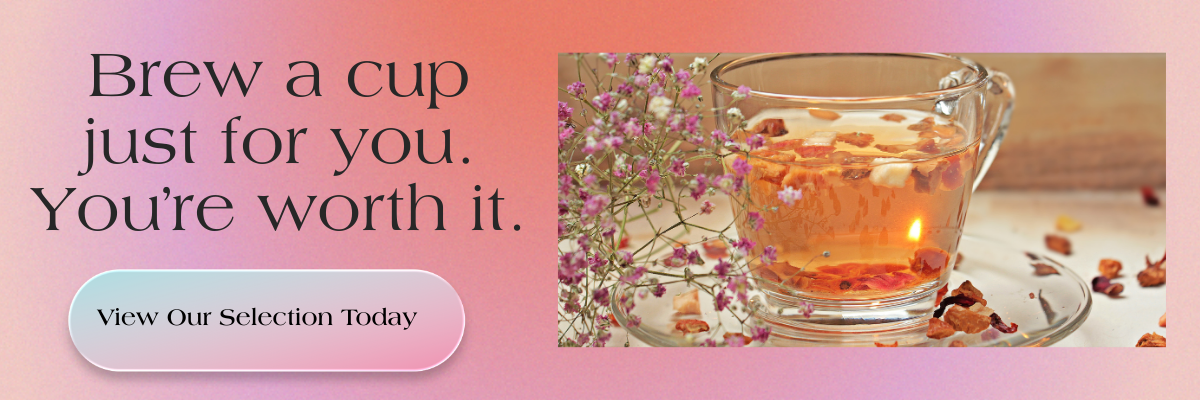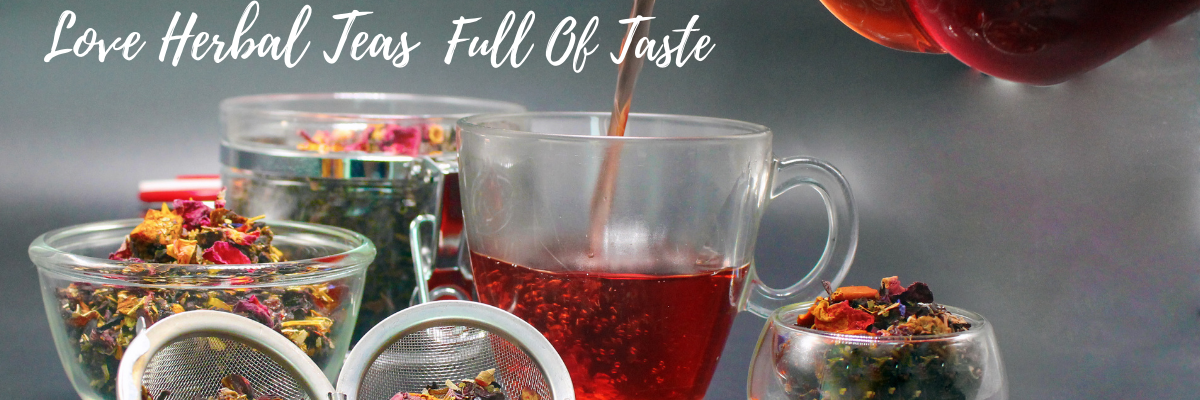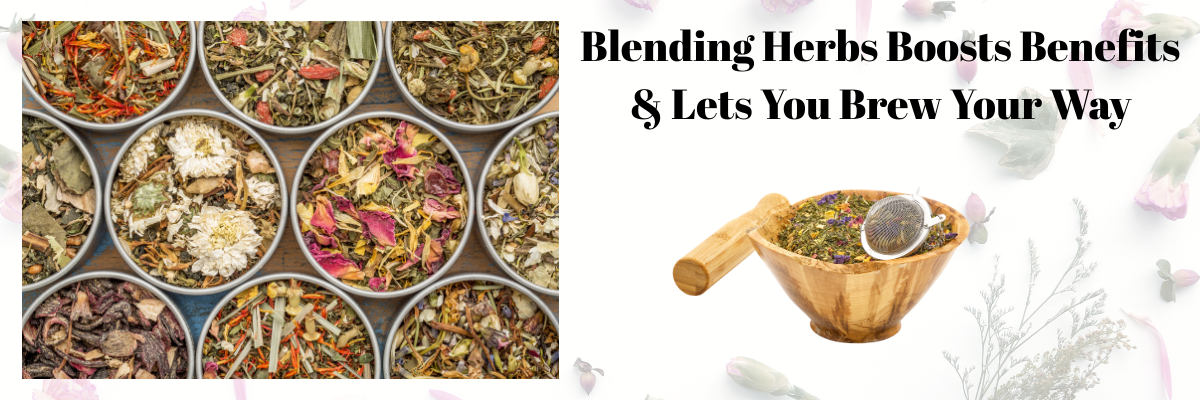The Ultimate Herbal Tea Guide: Top Teas for Health, Energy & Calm
(With Brewing Tips, Scientific Research, and Where to Buy High-Quality Herbs)
Why Sipping Herbal Tea Each Day Is One of the Best Things You Can Do for Yourself
Herbal teas are far more than just a soothing drink—they are time-honored allies in natural health, offering a simple yet powerful way to bring the healing energy of plants into your everyday life. Used for centuries across cultures—from Traditional Chinese Medicine and Ayurveda to Indigenous and Western herbalism—herbal teas have long been treasured as therapeutic tonics that gently support the body, mind, and spirit.
Unlike conventional black or green teas, which are made from the Camellia sinensis plant and often contain caffeine, herbal teas are crafted from a variety of healing plant parts—such as roots, leaves, flowers, barks, seeds, and fruits. This opens up a rich world of functional, flavor-rich infusions tailored to specific needs.
Struggling with sleepless nights? A cup of chamomile, passionflower, or Suan Zao Ren can calm the nervous system and encourage deeper, more restful sleep.
Feeling run-down or overwhelmed? Adaptogenic herbs like holy basil and Schisandra can help your body handle stress more gracefully.
Digestive upset after meals? Peppermint, ginger, or Chen Pi can ease bloating, gas, and sluggish digestion.
Worried about seasonal immune threats? Teas made with Echinacea, Huang Qi (Astragalus), or elderflower can help fortify your body’s defenses.
Herbal teas also offer a ritual—an intentional pause in your day to reconnect with your health, your breath, and the present moment. From the aroma of freshly steeped herbs to the warmth of the cup in your hand, this daily habit becomes a therapeutic act of self-care.
And the best part? Herbal teas are versatile, easy to prepare, and highly customizable. Whether you prefer a single-herb infusion or a complex formula designed to target a specific concern, there’s a tea blend for every season of life.
Drink to your health. Drink to your calm. Drink to your vitality. Herbal teas offer all this—and more—in every cup.
Top 12 Herbal Teas and Their Health Benefits
1. Chamomile Tea – For Sleep and Calm
-
TCM Function: Nourishes Heart and calms Shen (spirit).
-
Scientific Insight: Contains apigenin, a compound that binds to benzodiazepine receptors and promotes sleep PubMed.
-
Use: Steep 1–2 tsp flowers for 5–10 min.
-
When to Drink: 30 minutes before bed.
-
Pair with: Suan Zao Ren or Bai Zi Ren for enhanced sedative effect.
-
Shop: Chamomile Flowers
2. Peppermint Tea – For Digestion & Headache Relief
-
Benefits: Relieves bloating, gas, and muscle tension.
-
TCM Insight: Moves Liver Qi and clears heat.
-
Use: Steep fresh or dried leaves for 7–10 min.
-
When to Drink: After meals or during tension headaches.
-
Pair with: Chen Pi (aged tangerine peel) or Fo Shou (finger citron).
-
Shop: Peppermint Leaves
3. Lemon Balm (Melissa) – For Anxiety & Focus
-
Benefits: Mild mood elevator and cognitive enhancer.
-
Science: Shown to reduce stress and improve memory PubMed.
-
Use: Steep 1 tsp per cup for 10 min.
-
Pair with: He Huan Pi (Silktree Bark) or Yuan Zhi (Polygala Root).
-
Shop: Lemon Balm Loose Leaf
4. Ginger Tea – For Immunity and Nausea
-
Benefits: Fights inflammation, colds, and nausea.
-
TCM Insight: Warms the Spleen and disperses cold.
-
Use: Simmer fresh ginger slices for 10–15 min.
-
Pair with: Zi Su Ye (Perilla Leaf) or Ban Xia (Pinellia).
5. Hibiscus – For Blood Pressure and Detox
-
Benefits: Rich in antioxidants; supports heart health.
-
Science: May help lower blood pressure PubMed.
-
Use: Steep 1 tbsp dried petals for 7 min.
-
Pair with: Shan Zha (Hawthorn Berry) for enhanced cardiovascular support.
-
Shop: Hibiscus Flowers
6. Passionflower – For Insomnia and Nerves
-
Benefits: Calms the nervous system.
-
Use: Steep 1 tsp dried herb for 10 min.
-
Science: Increases GABA in the brain PubMed.
-
Pair with: Ye Jiao Teng (Polygonum Vine) or Fu Shen (Poria with Root).
-
Shop: Passionflower Herb
7. Rooibos – For Antioxidants and Skin Health
-
Benefits: Anti-aging, anti-inflammatory.
-
Caffeine-Free: Great for any time of day.
-
Use: Steep for 5–7 min.
-
Pair with: Gou Qi Zi (Goji Berries) or Ju Hua (Chrysanthemum).
-
Shop: Rooibos Tea Bags & Bulk
8. Echinacea – For Cold and Flu Prevention
-
Use: Steep roots and leaves 10–15 min.
-
Science: Enhances immune cell activity PubMed.
-
Best Time: Start at first sign of cold.
-
Pair with: Fang Feng (Siler Root) or Huang Qi (Astragalus).
9. Holy Basil (Tulsi) – For Stress and Adrenals
-
Benefits: Adaptogen for burnout and fatigue.
-
Use: Steep 1 tsp dried herb for 10 min.
-
Science: Cortisol-lowering effects PubMed.
-
Pair with: Wu Wei Zi (Schisandra) or Bai Zhu (Atractylodes).
-
Shop: Tulsi Leaf – 3 Varieties
10. Suan Zao Ren (Ziziphus) – For Deep Sleep and Heart Support
-
TCM: Nourishes Liver Blood, anchors Shen.
-
Ideal For: Those waking often at night.
-
Use: Simmer for 20 min with Bai Zi Ren.
-
Pair with: Long Yan Rou (Longan Fruit) or Fu Shen.
11. Bai Zhu – For Digestive Strength and Energy
-
TCM: Strengthens Spleen Qi, dries damp.
-
Ideal For: Low energy, weak digestion, and fatigue.
-
Use: Simmer root slices for 20 minutes.
-
Pair with: Dang Shen or Chen Pi.
-
Shop: Bai Zhu Root
12. Gou Teng – For Hypertension and Head Tension
-
TCM: Extinguishes Liver wind, clears heat.
-
Ideal For: Dizziness, tension headaches, and blood pressure.
-
Use: Simmer hooks in decoction or combine with Ju Hua.
-
Shop: Gou Teng Herb
Master Your Brew: Herbal Tea Timing & Temperature Chart
| Herb | Temp | Steep Time | When to Drink | Pair with |
|---|---|---|---|---|
| Chamomile | 200°F | 5–10 min | Nighttime | Suan Zao Ren |
| Peppermint | 200°F | 7–10 min | After meals | Chen Pi |
| Lemon Balm | 200°F | 10 min | Afternoon / Early PM | He Huan Pi |
| Ginger | Simmer | 10–15 min | Morning or during cold | Zi Su Ye |
| Hibiscus | 200°F | 5–7 min | Afternoon | Shan Zha |
| Rooibos | 200°F | 5–7 min | Any time | Gou Qi Zi |
| Suan Zao Ren | Simmer | 20+ min | Night | Bai Zi Ren |
| Bai Zhu | Simmer | 20+ min | Morning | Dang Shen |
| Gou Teng | Simmer | 20 min | Afternoon | Ju Hua |
Why Choose 1stChineseHerbs.com?
-
Certified Organic & Wildcrafted Herbs
Responsibly sourced from trusted farms and pristine wild regions to ensure the highest quality. -
Lab Tested for Purity, Potency & Safety
Every batch is independently tested for heavy metals, microbes, pesticides, and active compound levels—so you know exactly what you're getting. -
Transparent Ingredient Sourcing
We share where our herbs come from, how they’re processed, and when they were harvested—because you deserve to know what you’re putting in your body. -
Fast, Reliable U.S. Shipping with Eco-Friendly Packaging
Most orders ship within 24–48 hours in recyclable packaging. -
Expert Herbalist Support Available
Have questions? Our team includes certified herbalists who offer personalized guidance via email or live chat. -
Traditional Meets Modern
We honor ancient healing wisdom while embracing modern research and quality standards—giving you the best of both worlds. -
Customer Satisfaction Guaranteed
If something isn’t right, we’ll make it right. No stress, no hassle—just honest support. -
Free Herbal Resources & Education
We don’t just sell herbs—we teach you how to use them with confidence. Access free guides, brewing charts, and expert articles to support your journey.
FAQ
Q: Are herbal teas safe to drink every day?
Yes—when used appropriately, herbal teas are one of the safest and gentlest ways to support your health on a daily basis. In fact, many herbs are considered daily tonics in Traditional Chinese Medicine and other healing systems, designed to restore balance over time rather than give quick fixes. For example, drinking a cup of ginger tea every morning can support digestion and circulation, while sipping chamomile at night can promote restful sleep.
That said, it’s important to remember that herbs are powerful. Some herbs—like licorice root, senna, or certain detox blends—should only be used periodically or under guidance. And if you're pregnant, breastfeeding, or taking prescription medications, consult your healthcare provider or a qualified herbalist before adding new herbs to your routine.
Herbal teas can become a nourishing part of your wellness lifestyle, offering long-term benefits without the side effects common to synthetic options.
Q: Can I mix different herbs together, or will they cancel each other out?
Absolutely—you can combine herbs, and in fact, many of the most effective herbal teas are formulated for synergy. In Traditional Chinese Medicine, this is called herbal pairing or harmonizing, where complementary herbs work together to balance effects and increase potency.
For example:
-
For better sleep: Combine Chamomile + Suan Zao Ren + Bai Zi Ren + Passionflower.
-
For digestion: Blend Peppermint + Chen Pi + Ginger.
-
For immune support: Try Echinacea + Huang Qi (Astragalus) + Licorice Root.
When creating your own blends, consider taste, desired effect, and your body’s specific needs. If you’re unsure, look for professionally blended formulas or consult a trained herbalist.
Herbal blending is both an art and a science—and it's a great way to tailor teas to your unique wellness goals.
Q: Do herbal teas have any side effects? What should I be cautious about?
Herbal teas are typically very well-tolerated, especially when consumed in moderate amounts. However, just like with any wellness product, it's important to know your body and any sensitivities you might have.
Here are a few things to consider:
-
Strong immune herbs like Echinacea can sometimes overstimulate sensitive systems if taken daily for long periods.
-
Ginger is warming and stimulating, which is great for cold digestion but may cause heartburn if overused.
-
Licorice root, while excellent for adrenal support and sore throats, may raise blood pressure if consumed in large doses over time.
Start slow with any new herb. Notice how your body feels. Always read labels, and make sure the herbs are lab-tested for purity to avoid contaminants, fillers, or adulterated products.
When sourced properly and used with awareness, herbal teas are some of the safest, most supportive remedies available—empowering you to care for your body naturally.
Q: Why choose herbal tea over capsules or tinctures?
While capsules and tinctures are great for convenience and potency, tea offers a therapeutic experience that goes beyond ingestion. When you drink tea, you're not just getting the medicinal compounds—you’re also:
-
Hydrating your body
-
Relaxing your nervous system
-
Creating a mindfulness ritual
-
Supporting gentle, long-term healing
Brewing herbal tea is a form of self-care, a quiet moment that reconnects you with nature, your breath, and your wellness goals.
It’s not just what’s in the cup—it’s what the act of drinking herbal tea brings to your daily life.
Backed by tradition. Grounded in science. Shipped to your door.





